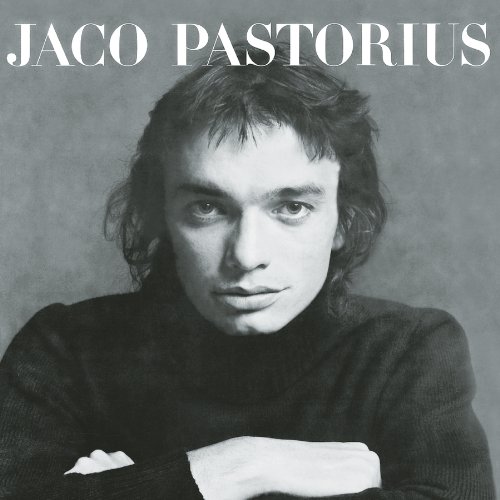1/23/11 – Jaco Pastorius
I have to get inspired by something that touches my soul, or rocks my soul.
– Steven Tyler
– Steven Tyler
Ok, so similar to the Antje Duvekot album a couple days back, this is one album I’ve been looking forward to getting to since this project was conceived. I had been told a number of times that I should listen to this guy, but never got around to it. When I picked up this CD over the new year’s break (when I went on a total binge at every used music store in Lewisville , TX
Jaco opens the album with “Donna Lee,” a bebop Miles Davis tune (often misattributed to Charlie Parker.) Accompanied by only Don Alias on congas, Jaco fires off lines with rapid-fire precision, and while still not a bebop fanatic, I found it quite impressive. When he brings the full horn section in on the next track, “Come On, Come Over,” the funk begins. I guess part of me was skeptical about a bassist being front man on a jazz album, but this track put those fears to rest. The harmonies are bare-bones – the verses vamp over one chord, while the chorus jams on a second. No deep harmonic analysis here. But that frees Jaco to do more than the task of just laying down roots a bassist is normally relegated to. This becomes a reoccurring theme throughout the album – a lack of harmonic diversity to allow Jaco to do his thing. The R&B duo Sam & Dave are spot on for this, the only vocal track on the CD.
“Continuum” is a slower, mantra-esque tune, with chorused bass carrying the melody throughout with shimmering electric piano and drums above. (Speaking of, you can’t go wrong on a debut album if you have Herbie Hancock on keys for you. And Wayne Shorter blowing over your tunes. The sidemen on this album are top quality…) One of the things that impresses me most, starting with “Continuum,” is how fluidly Jaco works the entire range of the instrument, from growling lows to soft mellow highs, and how easy he makes some of the double-stop work sound, not to mention the triple and quad stops. Amazing talent.
“Kuru/Speak Like a Child” is an amalgamation of a preexisting Herbie Hancock tune and one of Jaco’s originals. I’m not sure where one ends and the other begins. My first thought on hearing the tune is that the heavy string ensemble brought in was too overpowering, but the more I listen to it, the more I get into it. I guess I’m not used to jazz strings for one, and such aggressive, angular harmonies from a violin section, “boop smee” music aside. Herbie shines brilliantly on piano here.
The first of the prized jewels on this album though would have to be “Portrait of Tracy.” The only unaccompanied bass solo on the CD, Jaco plays his bass like some people play piano. The majority of the tune is played on natural and artificial harmonics, giving it a pristine, high bell-like tone. Once again, he carries a bass line flawlessly underneath the bright toned harmonic leads. Venturing both in and out of time, there are a number of rhythmically interesting subsections, but what gets me every time is the out-of-tune-yet-beautiful notes in the section starting at a 1:20 into the track. Pure genius.
“Opus Pocus” is another giant of this recording. Beginning with a pair of steel drum players, a couple phrases in, Jaco, Herbie, Don, and drummer Lenny White join in and throw down the funkiest groove on the record. And then, once that gets strongly established, Wayne Shorter’s soprano sax comes in screaming like some kind of angry madman. Both Shorter and Hancock take some extended solos on the tune, but Wayne
"Okonkole Y Trompa" turns out to be a bit of a letdown, though. Jaco and Don throw down an interesting 5/4 rhythmic loop, but it never develops and goes anywhere. Peter Gordon’s french horn work above it is mellow and contemplative, often reminiscent of the main theme to “Close Encounters of the Third Kind.” Nothing bad here, it just doesn’t hold a candle to most of the rest of the disc.
“(Used to be a) Cha Cha” is another low point for me. Hubert Laws flute work is an impressive addition to the album’s already stellar lineup, but the tune just doesn’t do anything for me. Interestingly, it seems to be one of the only tracks Jaco improvises on, taking a nice solo after the first head.
The final track is a bit of an anomaly; Jaco chooses to close his eponymous debut album with “Forgotten Love,” a tune he wrote for Herbie and the aforementioned giant string section. Jaco himself does not play a note. Regardless, the writing (and of course the performance) are stunningly beautiful – sweepingly neo-classical in nature and would be just as well received in an orchestral concert hall as in the jazz parlors.
As a side note, the proclamation that Jaco is the greatest electric bassist of all time is his own words, not mine. Not that I disagree with him. This album once again reminds me of everything I set out to discover with this project. There is so much great music out there. If I can stumble across an album of this calibre once a month along the way, it will continue to be a huge success in my eyes.
Tomorrow – Stravinsky: Petrushka
Next week – Blood, Sweat & Tears

No comments:
Post a Comment